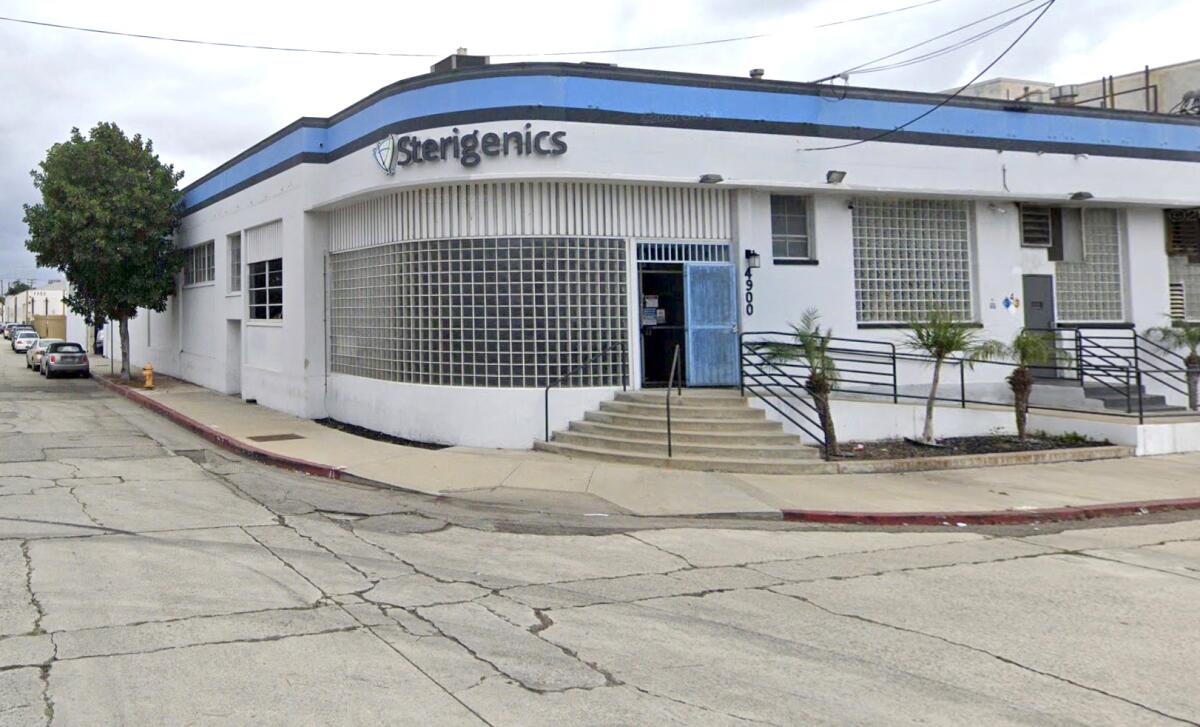Facilities emitting gas in Vernon will remain open during investigation

- Share via
The medical sterilizer facilities in Vernon that were found in violation of emitting a carcinogen at elevated levels will not be shuttered.
District 4 Los Angeles County Supervisor Janice Hahn had called for the Sterigenics facilities to be temporarily closed last week. She cited heightened emissions of ethylene oxide that could put people at risk.
But the South Coast Air Quality Management District determined that the facilities will stay open, stating in a letter Thursday that it will work with the facilities to ensure the safety of the community.
“South Coast AQMD is working with the operator of Sterigenics on immediate and near-term actions, including measures to reduce EtO missions,” Wayne Nastri, the executive officer, stated in the letter.
“I am not satisfied with the SCAQMD’s response,” Hahn said in a statement to The Times. “They say they are working with this company to lower the emissions of ethylene oxide but I think they need to cease operations until they can prove they can operate safely and not put workers and local residents at risk.”
Sterigenics’ Vernon facilities sterilize more than 45 million essential medical devices and supplies every year and supply them to nearly 100 healthcare manufacturers and hospitals, including those in L.A., Sterigenics spokesperson Kristin Gibbs told The Times.
“We are cooperating with the South Coast Air Quality Management District and have already made considerable progress to address the concerns that have been raised regarding our Vernon facilities,” the spokesperson said. “Sterigenics is implementing additional, voluntary enhancements at the facilities to further reduce emissions.”
The air quality agency began a review of Sterigenics facilities in two buildings between 49th and 50th streets on Gifford Avenue in March after the U.S. Environmental Protection Agency reevaluated the potential toxicity of ethylene oxide. The compound is a colorless gas used to sterilize medical equipment and make products such as adhesives.
Initial and subsequent air monitoring in March, April and May confirmed high levels of the gas surrounding the facilities. The levels prompted the agency to issue a notice of violation and notice to comply to the 50th Street facility and list both as potentially high-risk-level facilities.
The agency also issued a public notification in May according to Proposition 65, a required warning about significant chemical exposures that cause cancer, stating that the levels of ethylene oxide detected by the facilities are likely to affect public health nearby.
According to the EPA, ethylene oxide in the air around facilities is unlikely to pose any immediate health effects, but inhaling high amounts can cause headaches, nausea and respiratory irritation. Long-term exposure to the gas increases the risk of cancer, including breast cancer and leukemia.
The agency recorded a 63.9 ppb level of ethylene oxide near one of the facilities, substantially higher than the risk threshold of 3.18 ppb, which poses a cancer risk of 100 chances per million.
It is unclear whether these levels have persisted over a long-term period, Ian MacMillan of SCAQMD stated in the notice to Sterigenics. But if they have, workers at facilities adjacent to Sterigenics could be experiencing cancer risks as high as about 2,000 chances per million.
The nearest residential area, Maywood, is approximately 500 feet from the facilities, according to SCAQMD.
Agency spokesperson Nahal Mogharabi told The Times that air monitoring samples taken in the community are currently below health risk levels and current data show ethylene oxide levels drop significantly a few hundred feet from the facility.
Maywood is a low-income and predominantly Latino neighborhood. It has previously been affected by high levels of lead paint contamination in the soil caused by a former battery recycling facility operated by Exide Technologies in Vernon, according to a 2017 community survey report published by the Los Angeles County Department of Public Health.
Though the recycling facility permanently closed in 2015, the report found long-lasting effects of the contamination. The report also found 42% of the adults in the community are uninsured; according to a 2018 LACDPH report, the county average is 25%.
SCAQMD stated that it has not received any public complaints from the nearby community in the last five years.
“South Coast AQMD is taking immediate action to identify emission sources and reduce emissions as quickly as possible,” the agency’s spokesperson said. “We continue to conduct a full investigation and evaluation of all equipment to ensure that the facilities are following permit conditions, using best management practices to minimize emissions, and using proper emissions control equipment.”
More to Read
Sign up for Essential California
The most important California stories and recommendations in your inbox every morning.
You may occasionally receive promotional content from the Los Angeles Times.











